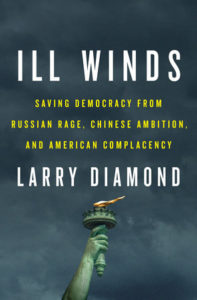 There is no democracy without liberty, and “illiberal democracy” poses an existential threat to European values and institutions, according to a new analysis.
There is no democracy without liberty, and “illiberal democracy” poses an existential threat to European values and institutions, according to a new analysis.
Popular discontent is fueled by a pervasive sense of economic injustice and political disenfranchisement, which EU governments have yet to address, says analyst Gijs de Vries, a senior visiting fellow at the London School of Economics and Political Science (LSE). Cultural causes of discontent are among the most complex. As part of its response the EU should strengthen its policies and budgets for citizenship, education, and culture, he writes in Cultural Freedom in European Foreign Policy, a report for the Institut für Auslandsbeziehungen (Institute for Foreign Cultural Relations, ifa)
Illiberal tendencies are putting pressure on the European political project committed to the rule of law, multilateralism and liberal-democratic values – not only from the outside, but also from within. To defend its values, Europe needs to know exactly where its credibility is called into question. From a European point of view, international cultural relations and cultural diplomacy promote cultural freedom and offer the possibility to support cultural agents whose space for expression is shrinking.
 Political scientist Larry Diamond (left) speaks of a global democratic recession. What do you expect in the coming years? Spanish daily El Pais asks Stanford University’s Francis Fukuyama.
Political scientist Larry Diamond (left) speaks of a global democratic recession. What do you expect in the coming years? Spanish daily El Pais asks Stanford University’s Francis Fukuyama.
I wish I knew. The big question is whether this is just a recession and we are going to recover or if we are going to a long-term depression. I am optimistic in general because I do not see a real alternative more attractive than liberal democracy. I do not think that people will soon adopt a model like China. Viktor Orbán is having many problems with that illiberal system he wants to create. Also, I think that some populist policies are going to produce real disasters, like Brexit ….
 With democracies being upended by insurgent political movements and deepening social divisions, why have mainstream parties been unable to mount an effective response? Project Syndicate asks:
With democracies being upended by insurgent political movements and deepening social divisions, why have mainstream parties been unable to mount an effective response? Project Syndicate asks:
- Slawomir Sierakowski notes that today’s populist forces owe their success as much to divisions among their opponents as to the strength of their ideas. ….
- Mitchell A. Orenstein shows that populist and illiberal governments have shored up their positions by delivering economic and social benefits to poor and middle-class voters…
- Bill Emmott explains that while populism might well work as a campaign tactic, the real secret to these politicians’ electoral success is their unapologetic embrace of a nationalist agenda….
- Jan-Werner Mueller warns that chauvinism works only for the right, leaving few options for a mainstream left that has lost its way – and many of its supporters – in the weeds of neoliberalism.
 What has surprised me most is that it has happened in the United States, and in the United Kingdom, and in some countries that were paragons of democracy, adds Fukuyama (left), a National Endowment for Democracy board member:
What has surprised me most is that it has happened in the United States, and in the United Kingdom, and in some countries that were paragons of democracy, adds Fukuyama (left), a National Endowment for Democracy board member:
I was surprised by the rise of these populist movements in consolidated democracies. They are a risk to the liberal democratic system that we have created. It is a global phenomenon, away from the agenda of the twentieth century, from the struggle over economic issues to one more based on identity. It is a worrisome movement, in which politicians use their democratic legitimacy to attack the liberal parts of the system, such as the Constitution, the institutions.







